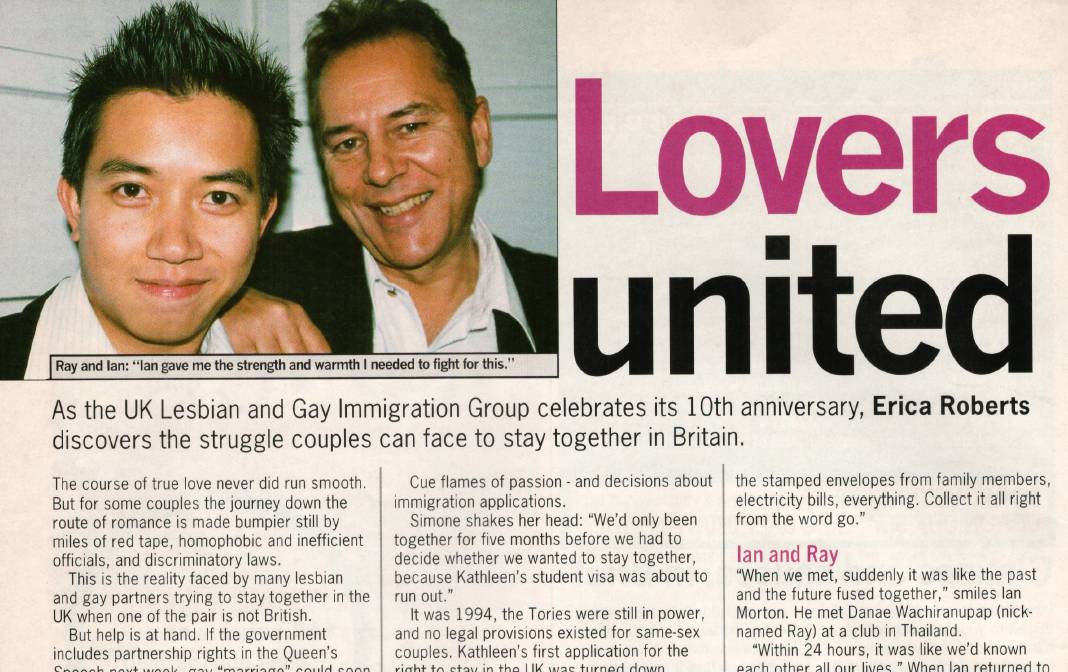
To celebrate our 30th anniversary, we spoke to many of the people who are an important part of our history. Below, Ian, ex-Chair and volunteer, told us what the organisation means to him.
I’ve been involved with the organisation for 25 years, since 1998. At the time it was called the Stonewall Immigration Group (SIG). I’d met the person who was to become my life partner, from Thailand, and we were looking at ways to stay together. We began looking for people who could help us and heard about the SIG telephone helpline. After a couple of initial phone calls, I went along to some of the in-person meetings, where LGBTQI+ couples met with lawyers for legal advice. These sessions were very helpful for my own personal situation, but I also became more interested in the Group’s underlying mission to change immigration law. Before I knew it, I started volunteering.
As a volunteer, I was able to meet both service users and the volunteer solicitors every month, both in the meetings and socially afterwards. It was hugely reassuring to know that so many people were confronting similar issues and as a bonus I met people who have become very good friends. Eventually I took more of a role in the running of the organisation, becoming a committee member. In summer 2000, when we suddenly found ourselves without an office, I built the original, very basic website in 3 weeks and rebuilt it twice in subsequent years. I didn’t have any previous training, experience or knowledge of website design, but I really enjoyed the challenge, and it was very satisfying when some of the people who came to the Saturday meetings told us how critical it had been to their understanding of their situation. I am told that many couples were able to make straightforward applications without using a solicitor, with the help of the website and forum.
“Though the initial purpose of the group had been achieved, it didn’t mean our work was done. Very quickly it was decided, given our established and growing profile, to refocus the mission of the group towards the support of LGBTQI+ people seeking asylum.”
The work of the Committee in those early days involved coordination of the effort to change the law and planning for the future of the organisation. The Unmarried Partners Concession which was announced not long after New Labour took office in 1997, became law in October 2000, effectively achieving immigration equality for same-sex couples and of course equality then came more widely with Civil Partnerships in 2005. Though the initial purpose of the group had been achieved, it didn’t mean our work was done. Very quickly it was decided, given our established and growing profile, to refocus the mission of the group towards the support of LGBTQI+ people seeking asylum. I became Chair just as the Asylum Support Project was set up with a part time project manager.
In early 2004, SIG rebranded to become the UK Gay and Lesbian Immigration Group (UKLGIG) and achieved charitable status. For many years we depended on the generosity of our founders such as Matthew Davies, Mark Watson and Wesley Gryk; by 2006, thanks to increasingly effective fundraising, we were in a position to hire our first Executive Director, Dr. Sebastian Rocca, and we moved into our first permanent office in 2007.
It was a very stimulating time to be involved with the organisation; there were huge challenges, but we were encouraged by a growing number of successes. I was always conscious, however, that neither I nor my partner had any lived experience of being an LGBTQI+ refugee or someone seeking asylum. After 2 or 3 years as chair, I decided to step aside for someone with more relevant experience, although I continued helping to run partnership meetings and maintained the group website until 2020.
When I first volunteered, I was on duty once a week on the phone lines and once a month at the Saturday meetings. Becoming involved with the organisation like this gave me a new, positive purpose; it was a real pleasure to do something good for people who needed support. I am proud of the work we did together. We and our core group of volunteer solicitors weren’t just campaigners who aimed to be a nuisance to the government. We developed a thoughtful style of gentle persuasion, education, and training. We understood that we couldn’t just scream and shout, despite the injustices all around us. We often faced political, public and tabloid backlash, but we kept going; we achieved so much by maintaining a standard we could sustain through quiet dedication and diligence.
“My personal connection with the organisation has been a liberating and highly positive experience, which I continue to value and treasure.”
Of course, not everything has always gone according to plan. Public support for LGBTQI+ migrants isn’t commonly flavour of the month, and over the years much of the right-wing press has had no problem reminding us of that. But such biased coverage also meant that good people heard about us and sought us out to show their support.
Being part of the charity has been a great privilege for me. It has given me the opportunity for experiences I would have been unlikely to encounter otherwise, meeting people from a diverse range of backgrounds. Former executive director Erin Power called us “unlikely friends”. Such friendships have opened my mind, almost certainly been closer as a result, and taken me in new, exciting directions.
UKLGIG became Rainbow Migration after a rebrand in 2020, and I am proud to see them continue to go from strength to strength. My personal connection with the organisation has been a liberating and highly positive experience, which I continue to value and treasure.
